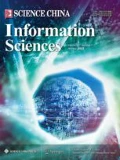Abstract
The theory of (n) truth degrees of formulas is proposed in modal logic for the first time. A consistency theorem is obtained which says that the (n) truth degree of a modality-free formula equals the truth degree of the formula in two-valued propositional logic. Variations of (n) truth degrees of formulas w.r.t. n in temporal logic is investigated. Moreover, the theory of (n) similarity degrees among modal formulas is proposed and the (n) modal logic metric space is derived therefrom which contains the classical logic metric space as a subspace. Finally, a kind of approximate reasoning theory is proposed in modal logic.
Similar content being viewed by others
References
Rosser J B, Turquette A R. Many-Valued Logics. Amsterdam: North-Holland, 1952
Pavelka J. On fuzzy logic I, II, III. Zeitschr.f Math. Logik u Grundlagen d Math. 1979, 25: 119–134, 447-464
De Glas M. Knowledge representation in a fuzzy setting. Tech Rep 89/48, Universite’ Pairs VI, Laforia, 1989
Ying M S. A logic for approximate reasoning. J Symbolic Logic, 1994, 59: 830–837
Wang G J. Theory of Σ - (α-tautologies) in revised Kleene system. Sci China Ser E-Inf Sci, 1998, 41(2): 188–195
Wang G J, Fu L, Song J S. Theory of truth degrees of propositions in two-valued logic. Sci China Ser A-Math, 2002, 45(9): 1106–1116
Wu H B. Theory of generalized tautology in Gödel logic system (in Chinese). Fuzzy Syst Math. 2000, 14(4): 53–59
Li J, Li S P, Xia Y F. Theory of truth degrees of propositions in n valued Lukasiwicz logic (in Chinese). Acta Math Sin, 2004, 47(4): 769–780
Pei D. On equivalent forms of fuzzy logic systems NM and IMTL. Fuzzy Sets Sys, 2003, 138: 187–195
Zhang X F, Meng G W, Zhang A Y. Implication operator families and their applications (in Chinese). Chinese J Comput, 2007, 30(3): 448–453
Li J, Wang G J. Theory of α-truth degrees in n-valued Gödel propositional logic (in Chinese). J Software, 2007, 18(1): 33–39
Li J, Wang G J. Theory of α-truth degrees in n-valued Lukasiwicz propositional logic (in Chinese). Comput Eng Appl, 2006, 42(31): 16–18
Han C, Wang G J, Xu W. A 16-classification partition of formula set F(S) in revised Kleene System \( \bar W \). Soft Comput, 2006, 10(2): 115–118
Li J, Wang G J. Theory of truth degrees of propositions in the logic system L n *. Sci China Ser F-Inf Sci, 2006, 49(4): 471–483
Wang G J, Qian G S, Dang C Y. Theory unified approximate reasoning in L * propositional calculus system and K * predicate calculus system. Sci China Ser F-Inf Sci, 2005, 48(1): 1–14
Wang G J, Wang W. Logical metric spaces (in Chinese). Acta Math Sin, 2001, 44(1): 159–168
Han B H, Wang G J. The conditional truth degree of formulas in classical propositional logic (in Chinese). Fuzzy Sys Math, 2007, 21(4): 9–15
Wang G J, Song J S. Graded method in propositional logic (in Chinese). Acta Electr Sin, 2006, 34(2): 252–257
Li B J, Wang G J. Theory of truth degrees of formulas in Lukasiwicz n-valued propositional logic and limit theorem. Sci China Ser F-Inf Sci, 2005, 48(6): 727–776
Wang G J. Comparison of deduction theorems in diverse logic systems. New Math Nat Comput, 2005, 1(1): 65–77
Zhou X N, Wang G J. Consistency degrees of theories in some systems of propositional fuzzy logic. Fuzzy Sets Syst, 2005, 152(3): 321–331
Wang G J, Zhang W X. Consistency degrees of finite theories in Lukasiwicz propositional fuzzy logic. Fuzzy Sets Syst, 2005, 149: 275–284
Zhou H J, Wang G J. A new theory consistency index based on deduction theorems in several logic system. Fuzzy Sets Syst, 2006, 157: 427–443
Zhou H J, Wang G J. Generalized consistency degrees of theories w.r.t. formulas in several standard complete logic systems. Fuzzy Sets Syst, 2006, 157: 2058–2073
Zhou H J, Wang G J, Zhou W. Consistency degrees of theories and methods of graded reasoning in n-valued R 0-logic (NM-Logic). Int J Approx Reason, 2006, 43: 117–132
Zhou H J, Wang G J. Characterizations of maximal consistent theories in the formal deductive system L * (NM-Logic) and Cantor space. Fuzzy Sets Syst, 2007, 158: 2951–2604
Wang G J, Leung Y. Integrated semantic and logic metric spaces. Fuzzy Sets Syst, 2003, 136: 71–91
Wang G J, Hui X J. Randomization of classical inference patterns and its application. Sci China Ser F-Inf Sci, 2007, 50(6): 867–877
Wang G J, Hui X J. Generalization of the fundamental theorem of probability logic (in Chinese). Acta Electr Sin, 2007, 35(7): 1333–1340
Wang G J. Quantified logic (I). Chinese J Engine Math (in Chinese), 2006, 23(2): 191–215
Wang G J. Introduction to Mathematical Logic and Resolution Principle (in Chinese). 2nd ed. Beijing: Science Press, 2007
Wang G J, Qin X Y, Zhou X N. An intrinsic fuzzy set on the universe of discourse of predicate formulas. Fuzzy Sets Syst, 2006, 157: 3145–3158
Blackburn P, Rijke M, Venema Y. Modal Logic. Cambridge: Cambridge University Press, 2001
Wang G J. Non-classical Propositional Logic and Approximate Reasoning (in Chinese). 2nd ed. Beijing: Science Press, 2008
Author information
Authors and Affiliations
Corresponding author
Additional information
Supported by the National Natural Science Foundation of China (Grant Nos. 10331010 and 10771129), and the Foundation of 211 Construction of Shaanxi Normal University
Rights and permissions
About this article
Cite this article
Wang, G., Duan, Q. Theory of (n) truth degrees of formulas in modal logic and a consistency theorem. Sci. China Ser. F-Inf. Sci. 52, 70–83 (2009). https://doi.org/10.1007/s11432-009-0008-x
Received:
Accepted:
Published:
Issue Date:
DOI: https://doi.org/10.1007/s11432-009-0008-x




